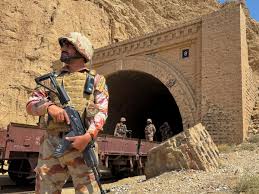
US designates Balochistan armed group in Pakistan as foreign terrorist organization

 :
| Updated On: 12-Aug-2025 @ 12:10 pm
:
| Updated On: 12-Aug-2025 @ 12:10 pmSHARE
The United States has intensified pressure on the Pakistan-based Balochistan Liberation Army (BLA) by officially designating it as a “foreign terrorist organisation”. This decision, announced on Monday by the US Department of State, follows the group’s earlier designation in 2019 as a “specially designated global terrorist” (SDGT). Known also as the Majeed Brigade, the BLA has been involved in numerous violent attacks, including the March siege of a train travelling from Quetta to Peshawar, which left dozens of passengers and soldiers dead.
According to US Secretary of State Marco Rubio, the move demonstrates the Trump administration’s commitment to countering terrorism and represents a stronger measure than the 2019 designation. Rubio stressed that terrorist listings are crucial tools to combat extremist threats, as they effectively curtail support for such organisations. The new classification makes it a criminal offence for anyone in the US to provide any kind of support—not just financial—to the BLA.
The BLA, a secessionist group, has a long history of armed struggle in Balochistan, Pakistan’s largest but poorest and least populated province. Since Pakistan’s creation in 1947, Balochistan has witnessed at least five major separatist uprisings. The current wave of insurgency began in the early 2000s, initially focused on controlling the province’s vast natural resources. Over time, its objectives have shifted toward full independence from Pakistan. Supporters of the movement accuse the Pakistani government of exploiting Balochistan’s resources while neglecting the welfare of its roughly 15 million residents.
Balochistan’s strategic importance is significant—it hosts deep-sea ports at Gwadar, a central hub in plans to link southwestern China to the Arabian Sea through Pakistan. The province’s geopolitical position makes it vital for trade, particularly in China’s Belt and Road Initiative. This importance, combined with ongoing violence, has drawn regional and international attention.
Tensions between Pakistan and India have been further strained by BLA activities. Islamabad has accused New Delhi of backing the separatists, but India has consistently denied these claims. The designation also comes shortly after the US labelled The Resistance Front (TRF)—an alleged offshoot of Lashkar-e-Taiba—as a foreign terrorist group. TRF was accused of carrying out an April attack in Indian-administered Kashmir that killed 26 people.
Relations between the US, Pakistan, and India remain complicated. In May, Donald Trump claimed credit for brokering a ceasefire after a brief India-Pakistan military confrontation, though India rejected the claim. Additionally, trade tensions between New Delhi and Washington have grown due to Trump’s tariff policies targeting India.
Diplomatic engagement with Pakistan has, however, been active. In June, Trump hosted Pakistani Army Chief Asim Munir, one of the country’s most influential figures, for lunch at the White House. The Trump administration has also explored economic collaboration with Pakistan, particularly in its natural resource sector and emerging cryptocurrency industry.
This new terrorist designation signals Washington’s firm stance on combating militant groups operating in South Asia, while also reflecting its balancing act between strategic cooperation with Pakistan and managing delicate ties with India.